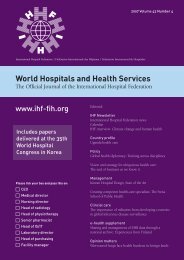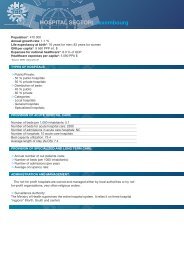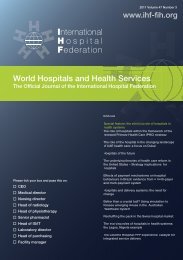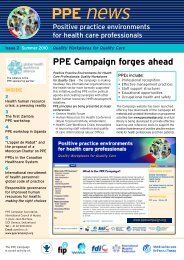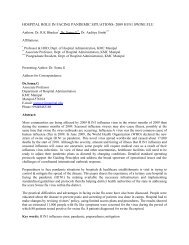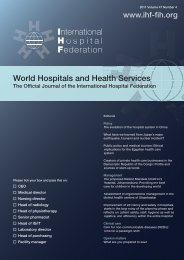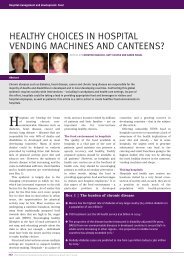Sajid Ahmed.pdf - International Hospital Federation
Sajid Ahmed.pdf - International Hospital Federation
Sajid Ahmed.pdf - International Hospital Federation
Create successful ePaper yourself
Turn your PDF publications into a flip-book with our unique Google optimized e-Paper software.
Does accreditation addresses ethical<br />
issues in cases from Middle East<br />
hospitals<br />
Dr. <strong>Sajid</strong> <strong>Ahmed</strong><br />
Accounts Manager, Accreditation Canada<br />
37 th IHF World <strong>Hospital</strong> Congress in Dubai, UAE<br />
November 8, 2011
Presentation outline<br />
Objective<br />
Evolution of ethics standards<br />
Methodology<br />
Results<br />
Health Ethics Framework<br />
Conclusion<br />
© Accreditation Canada <strong>International</strong><br />
2
Objective<br />
To identify how accreditation has<br />
mobilized organizations to address<br />
ethical issues and concerns at four<br />
hospitals in Saudi Arabia and Kuwait<br />
© Accreditation Canada <strong>International</strong><br />
3
Methodology<br />
Accreditation Canada implemented its<br />
accreditation process in four hospitals in the<br />
Middle East (three in Saudi Arabia and one in<br />
Kuwait)<br />
Three of the hospitals were private and one<br />
was a public teaching hospital<br />
Timeline approximately three years (2006 –<br />
2009)<br />
© Accreditation Canada <strong>International</strong><br />
4
Evolution of ethics standards<br />
Ethics standards addressing<br />
1986 – informed consent, patient choice/refusal of treatment,<br />
accessibility, restraints<br />
1991 – death and dying, abortion, research, patient complaints,<br />
organ donation and retrieval<br />
1995 – withdrawal of life support, confidentiality, conflict of<br />
interest<br />
2006 – written code of ethics<br />
2010 – ethical issues management, resource allocation, ethical<br />
implications of research projects<br />
© Accreditation Canada <strong>International</strong><br />
5
<strong>International</strong><br />
Accreditation Program<br />
Three-year Cycle<br />
SELF-ASSESSMENT<br />
• Client organization<br />
completes<br />
questionnaires and<br />
submits instrument<br />
and indicator data<br />
• Organization<br />
updates on-line<br />
profile<br />
SIMULATED<br />
SURVEY<br />
ON-SITE SURVEY<br />
Surveyors assess services<br />
and report findings<br />
EDUCATION<br />
Core and<br />
comprehensive<br />
sessions available<br />
Client<br />
Organization<br />
ACCREDITATION<br />
DECISION and<br />
REPORT<br />
READINESS ASSESSMENT and REPORT<br />
• Organization completes<br />
on-line profile<br />
• Assessment of fundamental elements of<br />
quality and safety using questionnaires<br />
and initial visit<br />
PROGRESS REVIEW<br />
Accreditation Canada reviews<br />
evidence of action taken and<br />
amends<br />
accreditation decision if<br />
applicable. Annual update of<br />
indicators required<br />
www.accreditation.ca<br />
© Accreditation Canada <strong>International</strong><br />
6
Readiness Assessment (RA)<br />
Accreditation Canada surveyors evaluated<br />
current structures, processes, and<br />
outcomes<br />
Interviews conducted with staff<br />
Thorough tour of the physical structure of<br />
the hospitals<br />
Ethics was one of the elements assessed<br />
© Accreditation Canada <strong>International</strong><br />
7
Results related to Ethics during the RA<br />
<strong>Hospital</strong>s had<br />
<br />
<br />
<br />
limited structures in place to deal with ethical issues<br />
or concerns including a lack of policy and<br />
procedure, ethical committee, ethical framework<br />
inconsistent practice related to obtaining informed<br />
and written consent prior to any surgical procedure<br />
or treatment, code of ethics, or support or education<br />
for staff<br />
absence of any kind of ethical framework lead to<br />
inconsistency in how staff dealt with ethical issues<br />
© Accreditation Canada <strong>International</strong><br />
8
Self Assessment Progress<br />
Following the readiness assessment, each<br />
hospital formed a minimum of five<br />
multidisciplinary teams — Leadership,<br />
Environment, Human Resources, Information<br />
Management, and Service Delivery (which<br />
included clinical program teams such as<br />
Medicine, Surgery, Maternal / Child, Emergency)<br />
Teams were tasked with assessing the care and<br />
services provided in their respective unit, against<br />
Accreditation Canada’s standards of excellence<br />
© Accreditation Canada <strong>International</strong><br />
9
Self Assessment Process<br />
Through this process, teams were able to<br />
develop action plans and implement<br />
improvement initiatives to address the focus<br />
areas identified in the readiness assessment<br />
Complete the self assessment through<br />
identification of strengths and areas of<br />
improvement<br />
Rating against criteria<br />
© Accreditation Canada <strong>International</strong><br />
10
Readiness Assessment to Survey<br />
Average period between readiness<br />
assessment and on-site survey is 28 months<br />
© Accreditation Canada <strong>International</strong><br />
11
Results of onsite survey related to<br />
Ethics<br />
Formation of an ethics committee<br />
Availability of an ethics coordinator<br />
Development of ethics-related policies and<br />
procedures<br />
Development of an ethical framework<br />
Increased education and training to staff<br />
around ethics<br />
© Accreditation Canada <strong>International</strong><br />
12
Results of onsite survey related to<br />
Ethics (cont’d)<br />
Increased resources to help deal with ethical<br />
issues<br />
Development of a code of ethics<br />
Discussed code of ethics at orientation<br />
Availability of code of ethics in Arabic<br />
© Accreditation Canada <strong>International</strong><br />
13
Health Ethics Framework for<br />
Supporting Ethical Practice<br />
Ref: Dr Robert Bucher, Ph. D<br />
Leading Ethicist in Canada<br />
© Accreditation Canada <strong>International</strong><br />
14
Common ethical concerns in healthcare<br />
Patient care<br />
Professional practice<br />
Institutional practice<br />
Organizational ethics<br />
© Accreditation Canada <strong>International</strong><br />
15
The Process for Ethical Decision-Making<br />
Problem<br />
Issues<br />
Stakeholders<br />
Options and assessment<br />
Decision<br />
Implementation<br />
© Accreditation Canada <strong>International</strong>
Problem<br />
What precisely, is the problem<br />
Who is responsible for taking the action<br />
required to implement the solution?<br />
Objectives at this stage<br />
<br />
<br />
Clarify the question<br />
Narrow question down to manageable proportions<br />
© Accreditation Canada <strong>International</strong>
Issues<br />
What are the ethical issues at play in this problem?<br />
What hospital/professional policies or goals are relevant<br />
to the problem?<br />
Objectives at this stage<br />
<br />
Formulate ethical context<br />
© Accreditation Canada <strong>International</strong>
Stakeholders<br />
Who are the relevant stakeholder groups?<br />
What are their interests?<br />
Are there conflicting interests between stakeholder<br />
groups<br />
Objectives at this stage<br />
<br />
<br />
Identify stakeholders<br />
Identify conflicts<br />
Sometimes ethical conflicts are between the legitimate<br />
interests of different groups<br />
© Accreditation Canada <strong>International</strong>
Options and Assessments<br />
What are the possible courses of action?<br />
Objectives at this stage<br />
<br />
<br />
<br />
<br />
Identify alternatives<br />
Evaluate<br />
Form judgement<br />
Make decision<br />
© Accreditation Canada <strong>International</strong>
Decision<br />
State the favoured outcome<br />
Explain reasons for preferring chosen outcome over the<br />
alternatives.<br />
Objectives at this stage<br />
<br />
<br />
Clearly identify decision<br />
Clearly articulate reasons for choice<br />
© Accreditation Canada <strong>International</strong>
Decision Check<br />
Apply the TV test.<br />
Would you be comfortable going on the 6 o’clock news and<br />
publicly stating and explaining your decision? (You should<br />
not expect to be able to satisfy everyone’s demands, but<br />
you should feel that an impartial and fair observer would<br />
accept the decision and the reasons upon which it was<br />
made.)<br />
© Accreditation Canada <strong>International</strong>
Implementation and Follow-Up<br />
Identify the steps required to put the choice into action<br />
Identify evaluation mechanism for follow up, if required<br />
Identify educational, information strategies as required<br />
Objectives at this stage<br />
<br />
<br />
<br />
Turn decision into action<br />
Provide evaluation mechanism<br />
Inform and educate<br />
© Accreditation Canada <strong>International</strong>
Conclusion<br />
Results clearly show that accreditation is an important<br />
tool in improving the management of ethical issues.<br />
Further work still needs to be done to increase ethical<br />
awareness, develop a consistent hospital-wide ethical<br />
framework for decision-making, establish clear definitions<br />
around the ethics committee mandate, identify ethical<br />
dilemmas related to clinical practice, and provide training<br />
to all staff on the hospital’s ethical framework.<br />
© Accreditation Canada <strong>International</strong><br />
24
Accreditation Canada <strong>International</strong><br />
For further information<br />
Dr <strong>Sajid</strong> <strong>Ahmed</strong><br />
Accounts Manager<br />
<strong>Sajid</strong>.<strong>Ahmed</strong>@accreditation.ca<br />
1-800-814-7769<br />
www.internationalaccreditation.ca<br />
© Accreditation Canada <strong>International</strong>
The leader in raising the bar for health quality<br />
Le leader qui hausse la barre en matière<br />
de qualité de santé



